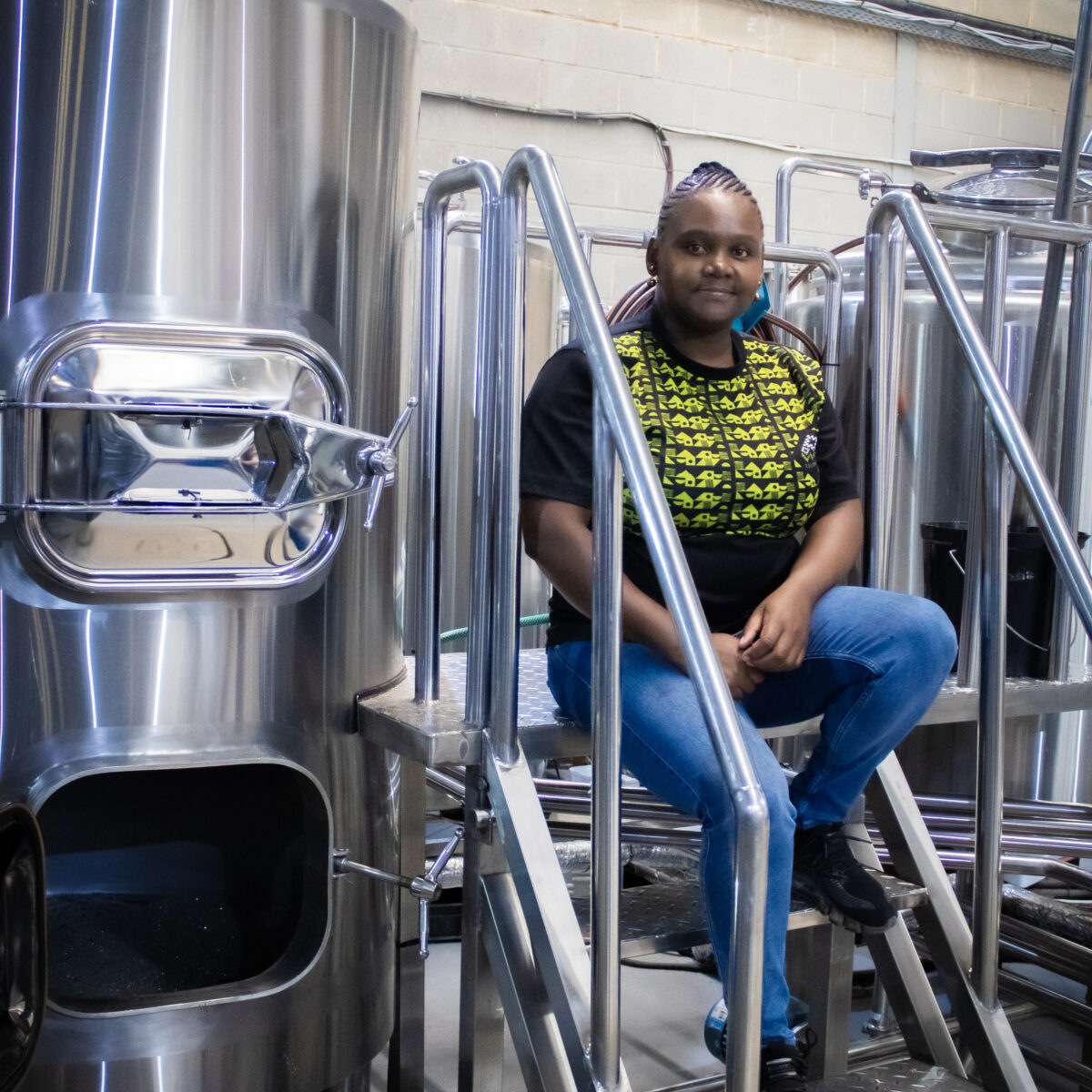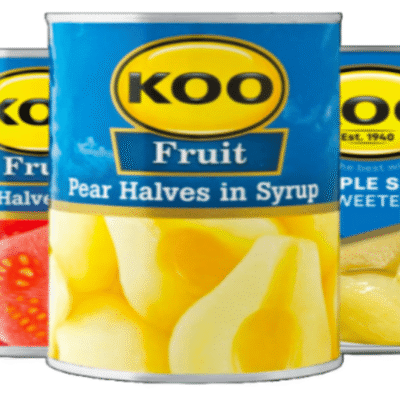“Building a business is a journey that takes time, especially for us as African entrepreneurs. The work we put in today isn’t just for us, it’s for future generations. What we build now lays the foundation for our children and grandchildren,” says Apiwe Nxusani-Mawela. These words capture the essence of her journey—a long, patient process that transcends immediate success, with an eye toward lasting impact.
When challenges arose and doors closed for her Tolokazi brand in South Africa, new opportunities emerged on the global stage, proving her belief in a vision that spans beyond the present. Today, Tolokazi stands as a “glocal” product—internationally recognized, yet deeply rooted in African authenticity.
Apiwe is a true pioneer. As the first South African to earn a National Diploma in clear fermented beverages and the first black woman to open a microbrewery in the country, she has shattered barriers in the brewing industry. Her company, Brewsters Craft, not only trains future brewers in the science of beer-making but also offers professional breweries expert beer quality testing and consultation services.
In this interview, Apiwe shares valuable insights on how to start and grow a food business in Africa. From finding your niche and understanding the market to scaling your business and taking it global while maintaining local authenticity. Apiwe’s advice is invaluable for anyone looking to make their mark in the African food industry.
Identifying Opportunities
What are the key factors to consider when identifying a profitable niche or product in the African food industry?
Passion is crucial. It’s the foundation for resilience when competing with industry giants and overcoming the many barriers entrepreneurs face. Passion fuels perseverance, especially during challenging times, such as days without sales. Believing in and being passionate about your vision helps you weather these storms.
Resilience, perseverance, and understanding your value proposition are equally essential. Realize that as a small player, growth will take time. Build a sustainable marketing strategy and focus on your long-term goals rather than directly competing with well-established brands.
How can aspiring entrepreneurs research market needs and assess demand effectively?
Start by identifying your target market and understanding the problem your product solves. Even if your product isn’t entirely new, focus on its unique value —why someone would switch from an established brand to yours. Analyze your competitors and find your differentiator.
Conduct a holistic market analysis—understand your customers, competitors, and industry trends. Recognize your strengths, weaknesses, opportunities, and threats (SWOT analysis). This groundwork will help you develop a strategy tailored to your product and audience, allowing for gradual, sustainable growth.
Planning for Success
What are the essential components of a successful business plan for a food business? Are there any unique aspects to consider for the African market?
A successful business plan must reflect Africa’s uniqueness. Highlight what makes your product authentically African and how it ties into African values and traditions. Showcase the blend of heritage and modernity, ensuring your product appeals to both contemporary and future markets.
The plan should also include a strategy for scaling beyond local or national boundaries. Africa is increasingly recognized globally for its innovations, making it essential to position your product for international markets while retaining its local identity.
Are there any tools or resources you’d recommend for entrepreneurs just getting started?
A SWOT analysis is invaluable for understanding the industry, your product, and its viability. Research what has been done before, both locally and globally. Learn from the successes and failures of others to refine your strategy and avoid common pitfalls.
Many young entrepreneurs overlook this research phase, but understanding the market can help fast-track your progress and avoid unnecessary setbacks.


Securing Funding and Resources
What are some effective funding options available specifically for African food entrepreneurs?
Securing funding remains a significant challenge. While venture capitalists and funding houses often focus on agriculture and innovation, everyday food products may struggle to attract investors. Governments frequently talk about supporting entrepreneurship, but access to funds is still limited, hindering growth and discouraging many aspiring entrepreneurs.
Building successful businesses within Africa could help address this issue. The continent needs more local venture capitalists and successful entrepreneurs who reinvest in their communities. Until then, reliance on external funding sources will remain a hurdle.
Do you have any advice for building relationships with investors, grant providers, or government programs?
Visibility is key. Entrepreneurs must actively seek opportunities and network within their industry. Attending exhibitions and joining associations can help you build relationships with potential investors. Consistently showing up at events signals commitment and reliability, increasing your chances of attracting the right partners.
It’s essential to demonstrate value and persistence. While you don’t want to overwhelm investors, being present and professional will help establish credibility and foster trust.
Understanding Regulations and Compliance
What are the basic regulatory requirements for food businesses in Africa?
Although food safety regulations vary by country, there are many commonalities across the continent. At the core is adherence to food safety standards like FSSC 22000, which govern how food is handled to ensure safety for human consumption.
Aspiring food entrepreneurs must familiarize themselves with local regulations, especially mandatory requirements. Ensuring compliance is essential, as the products are intended for human consumption, and safety must always be a priority.
Setting Up Operations and Supply Chain
What steps are involved in setting up an efficient production and supply chain, and how can entrepreneurs manage logistics effectively?
To establish an efficient production and supply chain, the starting point is rooted in your market analysis. It begins with clarity about the product you are creating, the target audience, and the strategy for delivering the product to them. From there, entrepreneurs need to determine production volumes and assess cost structures to ensure that the price point is accessible to the intended market segment.
When setting up production, it is essential to plan for both current and future needs. For example, while the current capacity must align with immediate goals, entrepreneurs should also consider scalability. Decisions about premises should account for the potential to double or quintuple production without requiring an entirely new facility. This foresight can prevent costly disruptions caused by rapid business growth.
Logistics planning is equally critical. Entrepreneurs must determine whether they will rely on online sales, direct deliveries, wholesale distribution, or other methods, with these choices being influenced by price points and profit margins. Every decision—whether it pertains to operations, pricing, or logistics—must balance short-term practicality with long-term business goals.
How important is quality control, and what are some best practices?
Quality control is vital in food production, ensuring the product meets safety and quality standards throughout every stage of production. A robust quality control system allows businesses to detect and address issues early, avoiding costly recalls or reputational damage.
Investing in quality control equipment and systems, even at the early stages of business, is non-negotiable. Skipping this step can lead to significant losses if a batch fails after being distributed. Beyond equipment, having skilled personnel with expertise in quality assurance is equally critical.
By implementing stringent checks at each production stage, businesses can trace and resolve issues effectively. Comprehensive records enable entrepreneurs to pinpoint problems, reducing wastage and protecting the brand’s reputation. For small businesses entering a market dominated by established brands, quality assurance becomes a competitive necessity. Without it, consumers are unlikely to switch from trusted products to a substandard alternative.
Branding and Marketing
What role does branding play in a food business, and what are effective ways to build a brand that resonates with local consumers?
Branding is fundamental to a food business, serving as the visual and emotional anchor for consumers. While the product’s quality and taste are crucial, the brand’s identity—the logo, colors, and story—communicates its essence.
For instance, at Tolokazi, the branding reflects a modern yet authentically African identity, steering away from clichéd imagery to embody a forward-looking Africa. The brand’s story celebrates women and aligns its visual and marketing elements with this narrative. Such alignment between a brand’s ethos and its presentation helps businesses connect deeply with consumers, transforming products into symbols of shared values and aspirations.
Can you share some tips on using digital marketing and social media to reach customers?
In today’s digital landscape, having a strong social media presence is indispensable. Platforms like TikTok, X (formerly Twitter), Instagram, Facebook, and LinkedIn offer cost-effective ways to reach diverse audiences. Entrepreneurs should select platforms strategically, tailoring content to suit each channel.
For example, LinkedIn is ideal for thought leadership and engaging with investors and stakeholders, while TikTok is more suitable for trendy, fast-paced content. Additionally, collaborating with influencers can amplify reach, but alignment with the brand’s identity is crucial. Choosing influencers whose values and audiences match your product ensures authenticity and maximizes impact.
Entrepreneurs must also focus on creating content that resonates with their target audience, emphasizing storytelling and visual appeal. Whether through engaging videos or interactive posts, a cohesive digital strategy can elevate a brand, foster loyalty, and drive growth.
Scaling the Business
What should entrepreneurs keep in mind as they look to scale their business, either by expanding locally or exporting?
One very important thing I’ve learned is that you must treat your business as a child. A child goes through different stages—from drinking milk to tasting solids, crawling, and then walking while leaning on things. Similarly, a business must go through its own stages. Scaling too quickly can lead to skipping fundamental phases in both the business life cycle and your growth as an entrepreneur.
For example, you might start off as a small team, just you. Then you grow to manage five people before scaling to 100 employees. If you haven’t learned how to manage people at a smaller scale or identify critical roles in your business, scaling too fast can create significant challenges. Transitioning from doing everything yourself to fully outsourcing without understanding the process can also be problematic.
When it comes to exporting, it’s tempting to get your product into international markets quickly. However, having a strong foundation locally is crucial. Your product should be well-established in your home market, where customers know and trust your brand. Local feedback allows for adjustments and improvements in a supportive environment. When you skip this step, your product might struggle internationally because no one knows the brand, which could affect its credibility.
Are there specific technologies or strategies that can help food businesses grow sustainably?
Sustainable growth requires a solid foundation and a gradual build-up. Technologies such as customer relationship management (CRM) tools, inventory management systems, and marketing automation can help streamline operations. Additionally, focusing on the quality of your product and building your brand consistently over time is essential.
General Advice
What are the most common mistakes you see new food entrepreneurs make, and how can they avoid them?
Mistakes are inevitable, but they provide growth opportunities. One key point is to ensure we don’t make the same mistakes repeatedly. Entrepreneurs need to learn from others and seek mentorship from those who are further along in the journey. Collaboration and shared experiences can prevent avoidable errors.
Another common issue is portraying entrepreneurship as glamorous while hiding the challenges. Often, entrepreneurs only share highlights, such as traveling to conferences or showcasing perfect product packaging. However, the reality includes struggles like failed packaging designs and exhaustion. This unrealistic portrayal can make others feel isolated when they face challenges. We need to normalize discussing setbacks and support each other through tough times.
If you could give one key piece of advice to someone starting a food business in Africa, what would it be?
Just do it. One motto I live by is, “Be so good they can’t ignore you.” Focus on doing what you do to the best of your ability, and everything else will fall into place.






